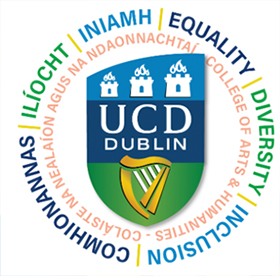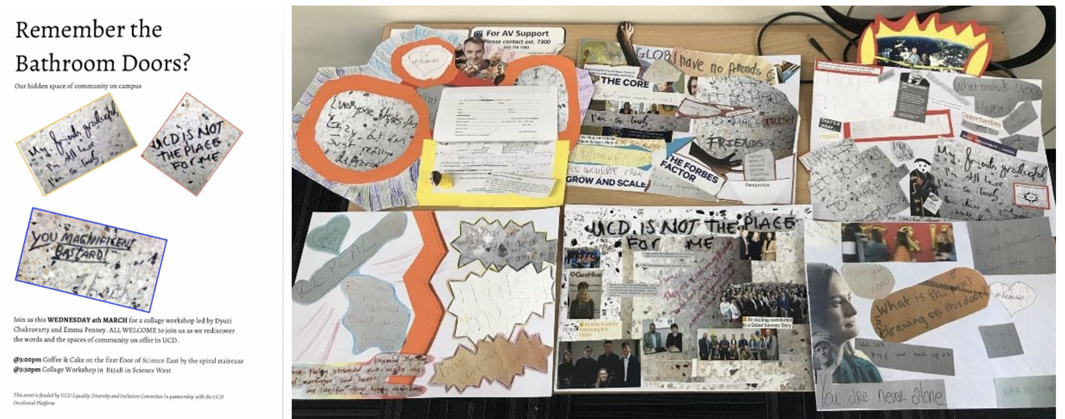 Gender, Sexuality, and Civil and Family Status
Gender, Sexuality, and Civil and Family Status
Teaching and Learning
Gender is a prominent topic across many modules within our College. In the School of English Drama and Film, for example, Kate Fama teaches is in singleness studies, modernism and sexuality, queer space, and the racialized contours of American domestic fiction. Cormac O’Brien has developed and delivers modules at undergrad and MA levels on: Masculinities; Gender/Queer; HIV and AIDS; and Sexuality and the State.
Discussions of gender have informed modules in the School of Music, such as stage two ‘Formal Analysis’, coordinated by Wolfgang Marx in spring 2020, in which students discussed gender issues as exemplified by Gubaidulina's second string quartet. Also, in spring 2020, the stage one module, ‘Music, Culture and Society’, coordinated by Laura Anderson, included study of gender and the musical canon.
In the School of Languages, Cultures and Linguistics, various modules have a gender focus. In ‘20th Century Italian Women Writers’, coordinated by Franceso Lucioli this year but based on Ursula Fanning’s research, key women writers are brought into dialogue with Feminist literary theory, problematizing the term 'women's writing' and considering what it might mean. In ‘Identity, Sex and Sexuality in Post-Revolutionary Cuba’, coordinated by Diana Battaglia, students explore read cultural artefacts with sex and sexuality as the focal point in order to engage with key concepts such as national identity, race and cultural hegemony. In Joseph Twist’s module ‘Transcultural Encounters 2’, students analyse how gender and sexuality intersects with Muslim identities, challenging western ideas of tradition and modernity.
Research
Research in this multifaceted field is being conducted in all areas of the College. In English, Drama and Film, Kate Fama’s research focuses on race, class, sex, and the architectural humanities, broadly conceived. She co-direct the Modern Architecture and Literature Project at the HI with Anne Fogarty and also co-directs the Singleness Studies Research Group with Jorie Lagerwey, which investigates singlism and the intersectional experience of single life as represented in modern and contemporary cultural forms.
Cormac O’Brien is conducting ongoing research into HIV/AIDS in Irish Culture and Politics, ‘Ireland in the Age of AIDS’, part of which included a Fulbright Scholarship to the University South Carolina in Spring 2019. The Fulbright award augmented ongoing research into cultural representations and socio-political histories of HIV/AIDS in Ireland with a focus on their public health and policy impact. Stemming from research undertaken during his PhD into the representation of HIV-positive masculinities and based in the ‘AIDS and its Impact’ special collections at USC, he investigated the socio-cultural histories of LGBTQ Irish/American diasporas during the AIDS crisis years (1981-96). This Project thus far includes several peer-reviewed articles, ongoing teaching at both undergrad and MA levels, and a PhD student commencing doctoral research into ‘Collective Memory and Representations of HIV/AIDS in Irish Culture’. His monograph Masculinities and Manhood in Contemporary Irish Culture: Acting the Man is due to be published with Palgrave Macmillan in May 2021). In it, he proposes a queer approach to dramatic and cultural production in order to engender a more egalitarian cultural industry.
Research is also being done in order to centre the voices of marginalised women. Sabine Strümper-Krobb (SLCL) gave a paper on ‘The transmission of Scandinavian literature around 1900’ in April 2020. Her current research foregrounds the often hidden role of female translators, demonstrating their importance for the transmission of Scandinavian culture in the German-speaking world and beyond.
Outreach, Impact and Service
The centrality of gender to the research, and teaching and learning of faculty in the College has informed various initiatives that seek to directly engage with important EDI matters on our campus. The College EDI committee organised a workshop entitled ‘#MeToo and the University’, led by Cormac O’Brien (SEDF) and visiting scholar Dawn Campbell (South Carolina). The workshop, which took place in January 2020, was designed to speak to the EDI categories of gender and sexual orientation. It was well attended and a productive conversation amongst staff and students developed around the themes of gender as construct, consent, and university support. Issues raised at the workshop include a severe lack of Student Counsellors and the need for a separate policy for sexual harassment and violence, which is now part of the plans for EDI policy at UCD.
Cormac O’Brien also took part in the public broadcast ‘Festival of Dangerous Ideas: Queer Hedge School’ between October 2020 - January 2021. Sponsored and web-hosted by The Gay Project, Cork, this was a public webinar series aimed at bridging the gap between academia and the general public by bringing critical, queer, and biopolitical thinking to LGBTQ and other interested communities across Ireland. Part of a team of 6 academics, Cormac designed and delivered the first 3 seminars which elaborated Irish histories of sexuality and gender in Ireland, explicating topics such as Irish masculinities, LGBTQ rights and feminist movements, and the sexuality/State nexus in Ireland since the foundation of the State. A key ethos of this project is to elaborate complex theories and histories in easily digestible and understandable ways, thereby achieving the aim (demonstrated by an average of 120 weekly attendees) of bringing Irish gender and sexuality scholarship to broader public audiences.
To mark International Women’s Day 2020, Francesco Lucioli (SLCL) took part in the event ‘Italian Renaissance (of) Women’, which was held at the Italian Institute of Culture. The topics of women’s contribution to the Renaissance was discussed through the images, voices and words of female readers, writers, editors, musicians and artists. The workshop ‘Remember the bathroom doors?’ was also organised to mark this day. This event was run by the Decolonial Platform with Dyuti Chakravarty (School of Sociology) and Emma Penney (SEDF), supported by Joseph Twist (SLCL) and the EDI committee. A collage workshop was organised to engage with photographs of the graffiti from the women’s toilets in Newman, which had recently been whitewashed. The workshop prompted discussions about inclusion, isolation with the neoliberal university, and unlikely spaces of community and support.

Anne Mullhall (SEDF), as Co-Director of the Centre for Gender, Feminisms & Sexualities with Aideen Quilty (Gender Studies, CSSL), has created a platform and space for active collaboration with activists, social movements and civil society to effect social change. The centre actively seeks collaboration with artists and writers from historically marginalised communities. In December 2019, they established the CGFS Queer Studies Forum along with Dr Aideen Quilty and students on the MA Gender, Sexuality & Culture and MA Gender Studies - a collaborative space supported by CGFS for queer researchers, facilitated by Matt Kennedy and Caleb O'Connor, PhD researchers in queer and trans studies in the School of EDF and in Gender Studies in the School of Social Policy, Social Work & Social Justice. In February 2020, the CGFS 'Queer Politics & Queer Activism' was held. It was an open meeting for the MA in Gender, Sexuality & Culture and MA Gender Studies and students on Queer Frictions module with Bulelani Mfaco, activist and organiser with MASI The Movement of Asylum Seekers in Ireland, Queer Action Ireland & UCD LGBTQ+ society.
On a more practical note, the Parenting Resources Initiative was led by Kate Fama (SEDF). With the new state recommendations for breastfeeding breaks now extended to 24 months, with insufficient campus facilities provided, and with the new introduction of Covid risks, facilities for parenting and feeding on campus are increasingly crucial for faculty, staff, students, and visitors. Last year saw an initiative to provide temporary BF facilities in the Arts Block (which has none, compared to the sciences). Working with Elaine Cregg (Newman Building Project Manager) and colleagues in the School (Pauline Slattery in particular), her initiative was largely successful but projects were put on hold. If community members are to be able to return to work and study after 6 months, close feeding, care, storage, and lactation facilities are a necessity.
The School of Languages, Cultures and Linguistics successfully applied for the Athena Swan Bronze Award, with Pascale Baker and Bettina Migge chairing the self-assessment team. The School is now working together across all committees to implement some key initiatives to deal with issues such as women’s promotion, work-life balance, and the low number of male students who choose to take languages at degree level.
Important work in the areas of Gender, Sexuality, and Civil and Family Status is also happening beyond UCD in wider society. Desmond Earley (Music), for instance, has taken the opportunity to commission more women composers with the Joyce Chamber Music project, including Natasa Paulberg (Australia), Elaine Agnew (Ireland) and Dale Trumbore (USA) in the most recent round of invitations.